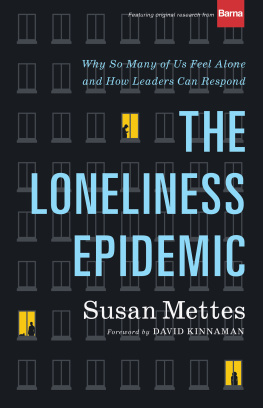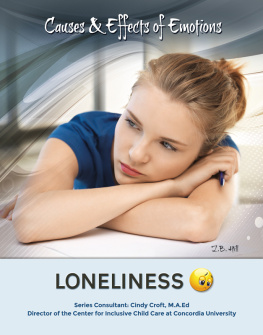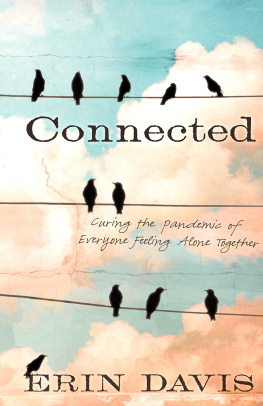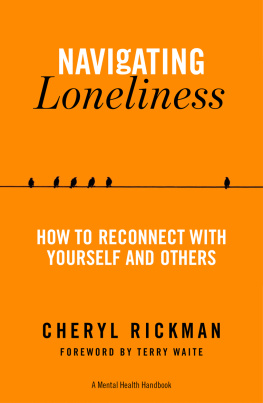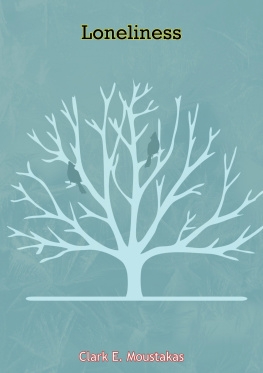1. Lonely Americans: Studying Our Loneliness
2. What Loneliness Is: A Definition of Terms
3. Age
4. Romance
5. Insecurity
6. Social Media
7. Faith and Churchgoing
8. Privacy
9. Belonging
10. Closeness
12. Breaking the Cycle
Foreword
DAVID KINNAMAN
On June 5, 2017, my life changed in an instant. My wife, Jill, checked herself into the hospital for a debilitating migraine. A few hours later, she texted me that a medical scan revealed a massive brain tumor. That day began a crazy-hard journey that has fundamentally shaped my understanding of loneliness.
I suppose Id felt lonely before that, but the past four years brought me to the deepest places of anguish, as my high school sweetheart and wife of twenty-five years passed away in late 2020 after a heroic, faith-filled battle with brain cancer. At times, Ive felt desperate, aching loneliness.
My crisis of loneliness was precipitated by the diagnosis and eventual death of Jill. Yet millions upon millions of people experience loneliness in our society in all sorts of ways and due to all sorts of factors.
To be crystal clear, loneliness is an intricately complex subject that is not at all the same thing as being alone, feeling sad or depressed, or simply being unmarried (which is a common misperception among Christian leaders). Ironically, some of the loneliest experiences can take place while youre surrounded by other people.
So what makes people lonely? What are the undercurrents and forces creating a lonelier society? And how can Christian communities better minister to the lonely? In this fantastic book, behavioral scientist and researcherand, I am honored to say, my good friend!Susan Mettes helps us get beneath the surface of these and other crucial questions.
Loneliness is multifaceted, and it has reached epidemic proportions. Consider these examples, based on research from our team at Barna Group:
- One in three adults in the United States (36%) say they feel lonely almost all the time or sometimes.
- The proportion of adults who say they could be accurately described as lonely has more than doubled in the span of just over twenty-five years, from 7 percent in 1994 to 12 percent in 2002 and to 20 percent in our most recent tracking.
- In research Barna conducted for the Boone Center for the Family at Pepperdine University, one in five Americans (22%) say they experience unwanted singleness that affects their most significant relationships. Whats more, nearly half of all practicing Christian Millennials (43%) say they experience unwanted singleness.
- Based on research we conducted in twenty-five countries and nine languages for World Vision, we found that one in four 18- to 35-year-olds around the world (23%) said they feel lonely and isolated from others. Furthermore, only one in three (32%) indicated that someone believes in me.
- If loneliness zoomed to crisis levels before 2020, it has even more importance in the wake of the mental health challenges wrought by the global pandemic. But as you will see in original research Barna conducted with Susan Mettes, rates of loneliness were unexpectedly flat through the first year of the pandemic. Still, young adults, people who feel insecure, and even people who want more privacy feel intense loneliness these days. Nor are churchgoers immune.
The fact that the United States has such widespread loneliness means that we have widespread problems with relationships. To have better relationships in our households, neighborhoods, and organizations, we need to address loneliness: individually and collectively.
Its not all doom and gloom, though. There are proactive, tangible ways forward.
For one thing, the subject of loneliness is no longer taboo. Lets acknowledge the positive development that we can better understand and talk about loneliness today than at any time before. I happen to believe its a good thing people are so willing to be honest about their emotions and self-perceptions, even in the context of anonymous survey research. As youll see in this book, Millennials and Gen Z are especially open about mental and emotional health topics and are also dealing with anxiety and loneliness at higher-than-average levels. Their candor on these topics should be another indicator that the time is ripe for richer explanations and better solutions to loneliness. (And, yes, social media makes relationships and connections challenging, but it cansurprisingly!actually play a positive role in alleviating loneliness.)
My team at Barna was privileged to work with Susan on this project, which has implications for so many people, for church leaders, and for our society. We thought research was the right way to approach this topic because we need to hear from lonely people themselves rather than guessing at what their experience is. At the outset, Susan explained to me that she wanted readers to understand other people better, and my hope is that this book will serve as encouragement that we can do something about loneliness.
I have worked alongside Susan on numerous projects with Barna Group over the years. I am especially grateful for her careful, nuanced, and biblical approach to problems, as she demonstrates here in this important book. In the writing process, Susan talked about wanting to stamp out stereotypesthat the lonely must be old and isolated, for example. Many people think we should have happy hours in retirement homes to address loneliness. In fact, people who are young are more likely to be lonely.
Susan offers meaningful ways the church can minister to lonely people, going far beyond simplistic solutions to addressing their inner lives and the God who understands them. If youre experiencing loneliness or know someone who isor if you work in churches, schools, companies, or organizations where there are human beings (yes, thats pretty much all of us)you should know what ideas are circulating about the crush of loneliness and the buffering of healthy relationships. Susan helps us to close these gaps.
In my own journey of bereavement and loneliness, Susans work has helped. With the assistance of her valuable insights, I strive each day toward greater connection with God, with others, and with my soul.

